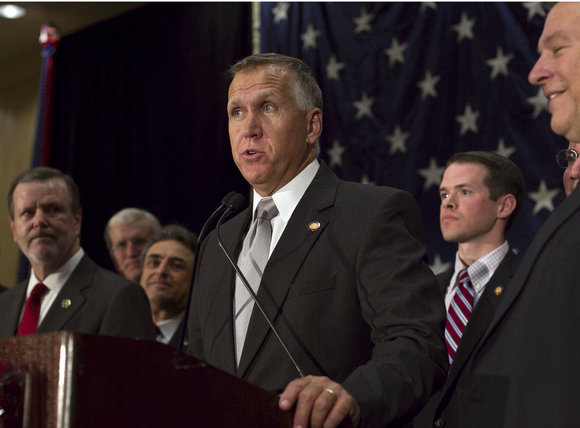The proposed sale of Rex Healthcare to WakeMed Health & Hospitals spurred North Carolina House Speaker Thom Tillis (R-Mecklenburg) to take a more thorough look at the assets on the state’s balance sheet.
Tillis picked a former House speaker, Rep. Harold Brubaker (R-Randolph) to head a committee that would examine surplus state property, including unwanted land, vehicles, and buildings.
Fiscal conservatives repeatedly have called for such a review. They say property that has commercial value and is not needed for state operations should be taken off the government ledger and put in private hands, where it can generate tax revenues. Liberals are more cautious, warning against shedding buildings and other property that is used to provide essential public services.
Committee Forming
Jordan Shaw, a spokesman for Tillis, said Brubaker is currently putting together a committee to look at asset distribution and management.
“They are not too far along in the process,” Shaw said. “[The committee] will be looking at various assets and options and asking if the State of North Carolina should be responsible for running these assets. A body of individuals will meet to ascertain this, and it will be a very deliberate process.”
Shaw said the $750 million unsolicited bid by WakeMed to purchase Rex Healthcare from UNC Hospitals kicked off the process, but he’s not sure what other assets will be considered when the panel meets.
Long List of Assets
Americans for Prosperity North Carolina Director Dallas Woodhouse says there is a vast list of land and other assets the state either is not using or is losing tax revenue on that could be sold to raise money for the state.
As examples, Woodhouse said railroads, airplanes, prisons, ports, lodges, retreat centers, liquor stores, and the “second” governor’s mansion near Asheville should be on the block.
“If we are selling off property that is not needed or was purchased for [a] dubious reason, that is good,” he said. “Over time it could raise tens of millions of dollars. If it is sold to the right owner and is privatized, the business or the property could get back on the tax rolls, and that’s a good thing.”
Woodhouse cited Kinston’s Global TransPark as a specific example of a state asset that may have a low net worth but could save taxpayers money from ongoing maintenance and debt costs if it were sold.
“It’s one of the huge boondoggles of all time,” he said. “Anything we can do to get rid of it would be good. It’s a nightmare that never ends.”
‘No Justification for State’
Brian Balfour, a policy analyst for the Civitas Institute, agrees. “There is no justification in my mind for the state to keep running [the GTP],” he said. “It’s been outed as a money pit that taxpayers have been paying for years. There’s no justification in my mind for the state to continue to operate it. It should be left to the private sector to run.”
Balfour said state leaders should look at all ongoing maintenance and operation costs of public assets before determining whether to sell something.
“We could raise and save hundreds of millions of dollars right off the top,” he said. “It certainly could relieve budget pressures now and in the future.”
Woodhouse said there is no doubt the selling of state assets is a difficult process, and the taxpayers have to maintain their “don’t raise my taxes” stand in order to see progress continue.
Temptation for Lease-Backs
He said those reviewing state assets must avoid the temptation to sell property the state now uses and then lease it back to the government.
“That is not good if the property is something the state legitimately needs,” he said. “That only takes the equity out. To get the money out and then rent it for government use is not a good idea.”
Woodhouse also said the state must avoid putting stipulations on the property when they sell it.
“This is key,” he said. “They shouldn’t control or have stipulations on how it is used once it is sold off.”
Rob Thompson, coordinator of the liberal group Together NC, said he generally worries about selling state assets because it can jeopardize the state and can undermine the state’s ability to provide services.
Ways to Balance Budget
However, he said, during difficult financial times state leaders have to look at responsible ways to balance the budget.
“It’s a tightrope walk,” he said. “Selling assets we don’t need or use any more makes sense.” Thompson said his organization will continue to monitor the proposed sales, along with any budget cuts in education, criminal justice, human services, and programs that have an impact on people.
Jill Lucas, communications director for the North Carolina Department of Administration, said her department currently is developing the protocol for the selling of state assets.
“We are deep in the process,” she said. “It’s going to be very exacting and appropriate when it is put in place.… It’s a new order, and we have to be very thorough in creating a protocol that is comprehensive.”
Karen Welsh ([email protected]) is a contributor to Carolina Journal, where an earlier version of this article first appeared. Used with permission.




